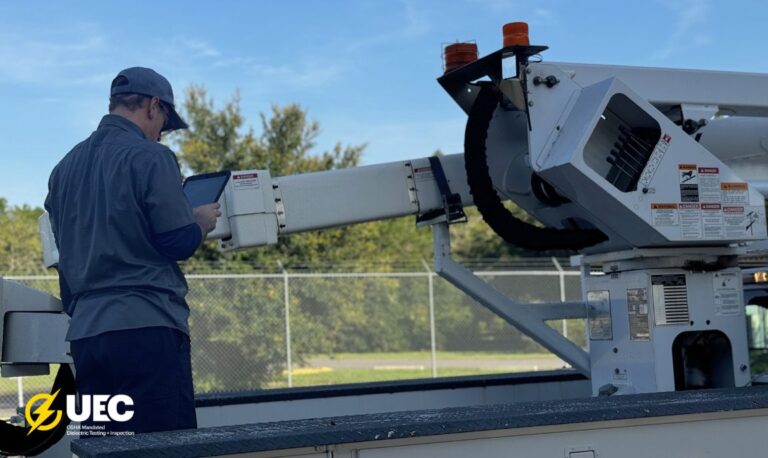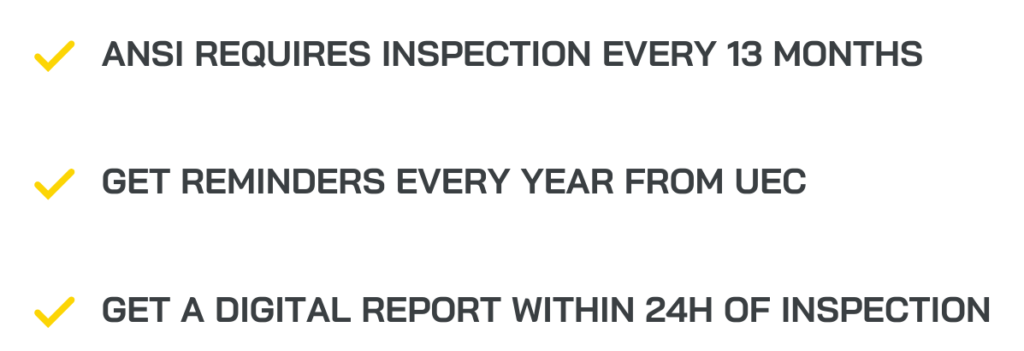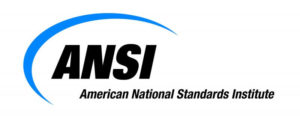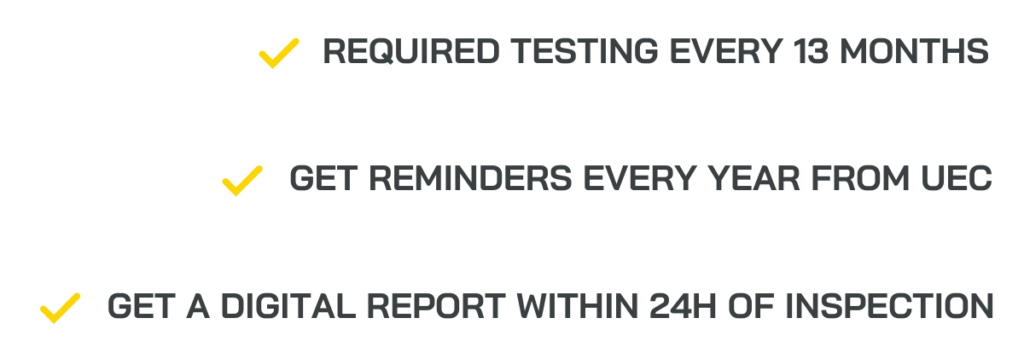
#1 On-site services. we come to you!
Operating seven days a week, serving Florida and Georgia, our operations are certified by both the Crane Institute of America and the Von Corporation.
UEC now ranks #1 in Orlando for Bucket Truck Dielectric Testing and ANSI Inspections
We deliver on-site Dielectric Testing and ANSI Annual Inspection services that exceed OSHA/ANSI standards. Ensuring minimal downtime with our weekend availability for the public and private sectors in Florida and Georgia.









Licensed and insured with $2M in coverage, enabling work on government properties.
Digital reporting inclusive of photographic evidence for all identified discrepancies.
Save time and money with on-site service in Florida & Georgia, we come to you 7-days a week.


Prioritize safety for your team, stakeholders, and yourself with our hassle-free annual inspection services.
The short answer is, YES.
Part of the updated ANSI A92.22 standards, now in effect in the United States, include requirements for annual machine inspections (AMI) on mobile elevating work platforms (MEWPs).
Specifically, the standards state the following as pertaining to the completion of an AMI:
“Owners shall ensure an annual inspection is performed no later than thirteen (13) months from the date of the prior annual inspection. The inspection shall be performed by a person qualified to inspect the specific make and model of MEWP. The inspection shall include all items included in the frequent inspection plus items specified by the manufacturer for an annual inspection, to include manufacturer’s bulletins. The inspection shall verify that the MEWP is registered with the MEWP manufacturer and that any open safety-related bulletins are addressed as part of the inspection. The MEWP shall not be placed back into service until all malfunctions and problems identified in the inspection have been corrected.”
The Reliable Performance
A thorough inspection leads to lifts that operate reliably, preventing unexpected downtime. After service, lifts function with precision, as any potential safety hazards have been addressed.
Cost-Efficiency
Regular inspections can identify issues early, leading to cost savings on repairs. Certified checks can extend the lifespan of your equipment, optimizing your investment.
Operational Confidence
With each lift passing rigorous inspection criteria, you gain confidence in your equipment’s performance, ensuring safety and efficiency in your operations.
Compliance Assurance
Our service confirms that your lifts meet all current ANSI regulatory standards, keeping your operations compliant and up to date.
Regular inspections are crucial to identify any potential issues with your aerial lift equipment before they lead to downtime or, worse, accidents. Recognizing the warning signs early can be the difference between a minor repair and a major operational halt.
Signs your Aerial Lift Needs Inspection:
These symptoms could point to underlying issues with the lift’s hydraulics, electrical systems, or structural components.
Catching these early, with the help of our specialized inspection services, prevents bigger problems and ensures compliance with safety regulations.
OSHA regulations are laws, which means they are subject to government enforcement.

OSHA is the government agency in charge of making rules for aerial lift usage
ANSI standards, however, are not laws.
Instead, they are the industry guidelines for aerial lift design, operation, and safety.

ANSI is the organization that devises industry rules for the design and use of aerial lifts
So, does that mean you don’t have to follow ANSI’s standards?
Not necessarily.
OSHA often incorporates ANSI rules by reference, which means they can carry the force of law.
So ensure you follow both OSHA and ANSI’s rules on aerial lifts, including inspections.
If you’re wondering, “What are the OSHA aerial lift annual inspection requirements?” the answer is that OSHA doesn’t specify.
Instead, the ANSI establishes the annual inspection requirements.
And recall that OSHA sometimes incorporates ANSI rules into the law.
So, you should follow what ANSI says on the topic.
Now, what does ANSI say about annual inspections?
They state annual inspections must be performed at most thirteen months after the previous inspection.
CALL UEC TODAY! 407-256-6761
Prioritize safety for your team, stakeholders, and yourself with our hassle-free annual inspection services.
Dielectric testing is an inspection process that is crucial for bucket trucks, manlifts, tow trucks, boom trucks, utility trucks, and other commercial vehicles. In short, the inspection ensures that the insulation on all of the electronic components on your vehicle are secure and working properly. This helps to ensure the safety of your workers, on and off the rig—as well as the optimal performance of your equipment.
Bucket Trucks
All use of bucket trucks and other commercial vehicles are regulated by OSHA (the Occupational Safety and Health Administration) and ANSI (the American National Standards Institute), organizations that help enforce procedures and testing to keep workers and pedestrians safe in work zones and around commercial machinery.
Dielectric Testing Services | Florida & Georgia
In order to meet the legal requirements of using boom trucks and other vehicles, fleet owners need to maintain certain standards. This includes three mandatory tests—aerial lift testing, DOT testings, and dielectric testing—performed on an annual basis. If you need dielectric testing services for bucket trucks, please get in touch with us.
If your business uses one or more man lifts, tow trucks, or other commercial vehicles, dielectric testing (which, in the case of bucket trucks, is often called hi-pot, or high-potential testing) is not only recommended—it is required. Failure to comply with these regulations (or the failure to repair issues identified in a dielectric test) is in direct violation and could result in legal or disciplinary action.
In addition to ensuring regulatory compliance, proper testing (as well as the recording of the results) can help detect existing issues with your vehicles. This allows you to make corrections or adjustments that will prevent future problems, hazards, and safety concerns—as well as reduce the potential cost you will have from correcting said issues.
The barriers of electric insulation on your vehicle protect operators and surrounding pedestrians from dangerous electrical currents moving through your equipment. Through appropriate testing, you can ensure that the peak level of voltage does not exceed the resistance of the barrier material—keeping your equipment from being damaged and preventing human injury.
Dielectric tests can also evaluate the integrity of your equipment on multiple levels, depending on the type of test performed. For example, a dielectric strength test is designed to evaluate how high the voltage needs to be before the insulating material allows it to flow through. Alternatively, a dielectric withstand test measures the amount of time the insulation can hold a high voltage current before it begins to break down.
CALL UEC TODAY! 407-256-6761
For this test, the computer will analyze the sounds your vehicle makes while it is operating. The technology calculates the stability of your equipment by comparing the size of the truck and the loads it carries. Then, it determines a quality score. This grade is evaluated on a scale to determine whether or not your vehicle meets the necessary criteria in order to safely operate.
According to the ANSI, a dielectric test verifies the electrical insulating strength in the FRP (Fibreglass-Reinforced Plastic) parts of upper and lower booms, buckets, liners, digger derrick extensions, tool circuits, and upper control systems on certain types of commercial vehicles. During the inspection, if any defects are found, the issues are classified according to severity.
In this inspection, different parts of the truck are evaluated for functionality and condition. Though the specific parts may vary depending on the type of truck, the parts inspected usually include a minimum of twelve points of inspection:
In order to ensure that your vehicle passes inspection, it is crucial that you keep all of these parts in good working order with regular maintenance, repairs, and internal inspections. Other suggestions for proper maintenance of your vehicle can be found in manufacturer’s guidelines, owners manuals, and in the guidelines for your affiliated regulatory agencies.
CALL UEC TODAY! 407-256-6761



Trustindex verifies that the original source of the review is Google. Fantastic work from Garrison, very fast and efficient. Communication is great and their availability is really good.Santiago ATrustindex verifies that the original source of the review is Google. Informative and Professional. Garrison was very knowledgeable and patient with me, answered any questions that I had when it came to what all is part of the testing process.Steven MTrustindex verifies that the original source of the review is Google. Great & timely serviceJoseangel gTrustindex verifies that the original source of the review is Google. Best service in town! Highly recommended!!!Robert STrustindex verifies that the original source of the review is Google. Extremely professional. Always willing to work around crews schedules. Great work !!!!Mike MTrustindex verifies that the original source of the review is Google. We are a large Infrastructure company in the power delivery sector. Utility Equipment Consultants has been testing are equipment for 15 plus years. They are an awesome company to work with and do a very thorough job! Would highly recommend.Victor h
©2026 Utility Equipment Consultants | #1 On-site Services | Powered by Amiga Web Design